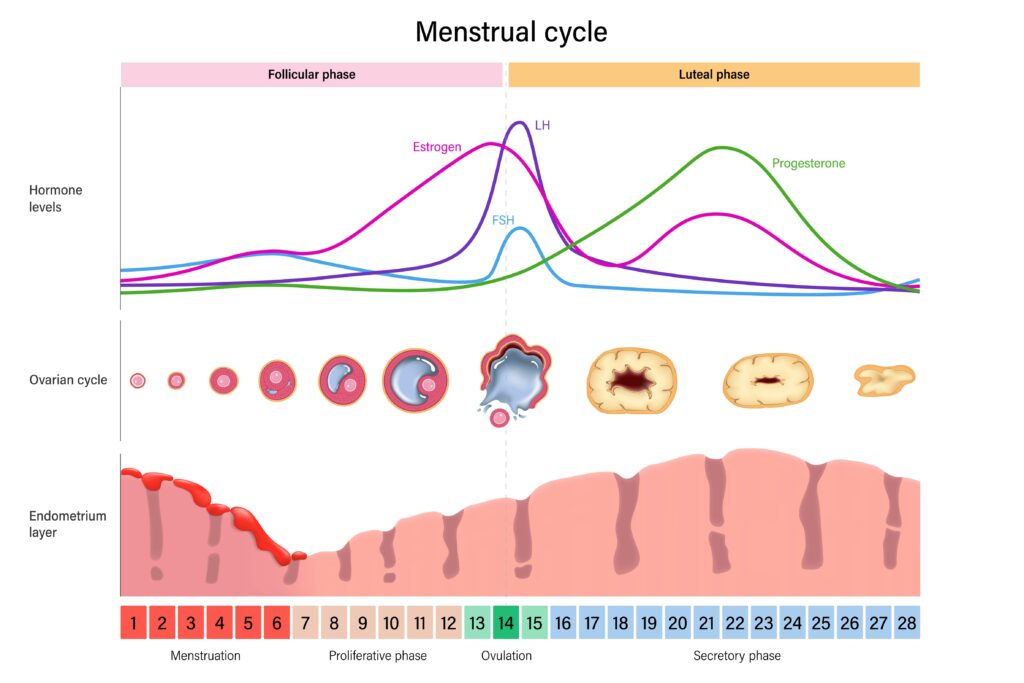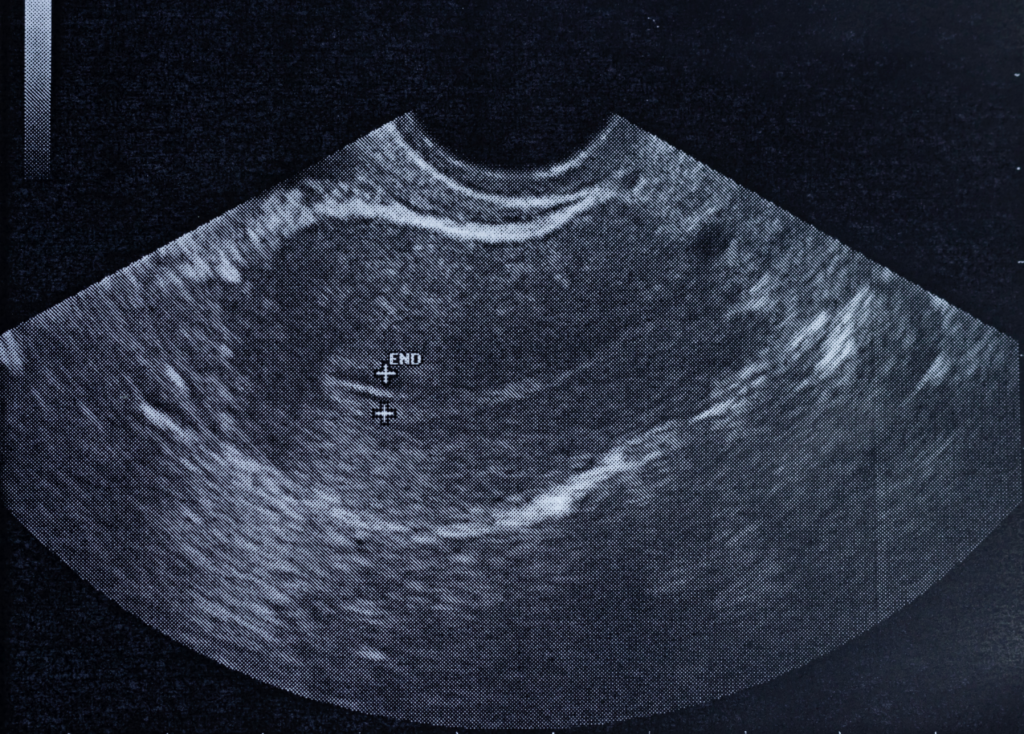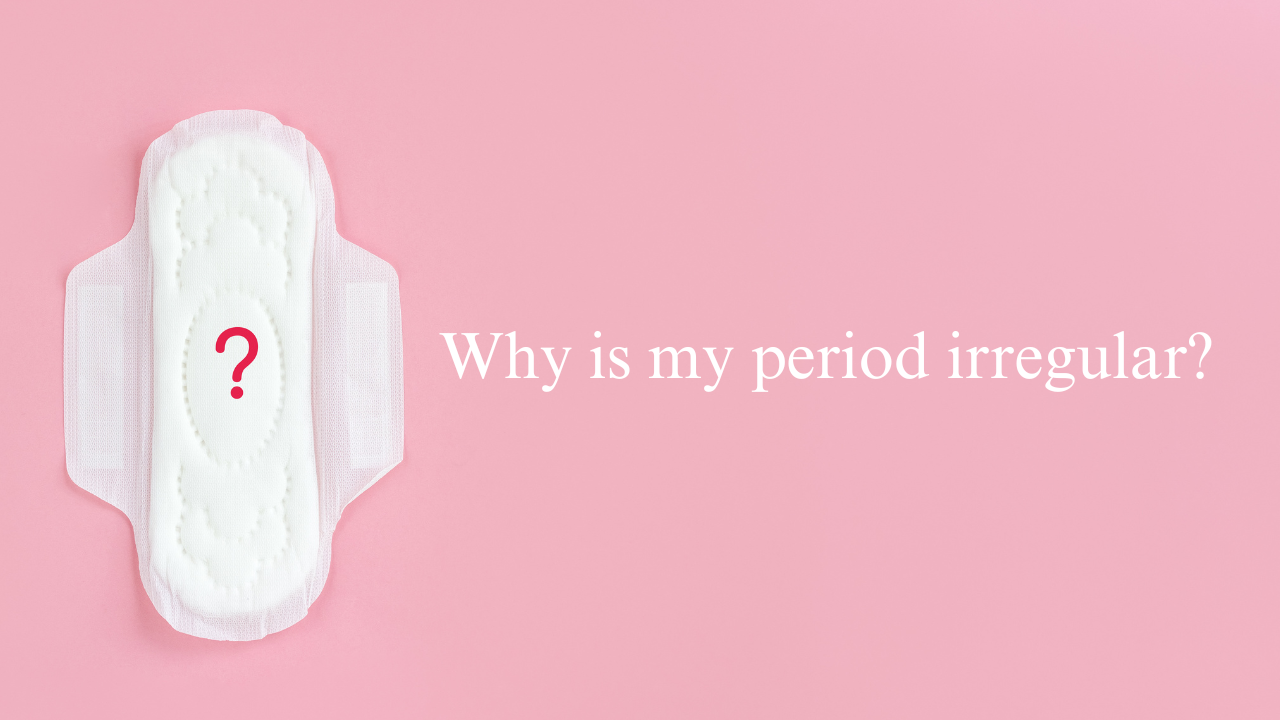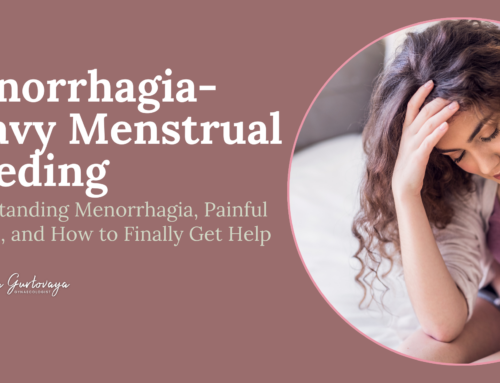Are you experiencing changes in your menstrual cycle? Concerned about irregular periods?
Many women come to see me with concerns about irregular periods, and it’s important to understand that whilst some variation is normal, persistent changes can sometimes signal underlying health issues that deserve attention.
What Makes a Period “Irregular”
Whilst we often hear that a “normal” cycle is 28 days, the reality is more nuanced. A regular cycle can range from 21 to 35 days. Your period might be irregular if you’re experiencing:
– Unpredictable timing between periods
– Changes in how heavy or light your bleeding is
– Missed periods (fewer than 9 periods per year)
– Unexpected spotting between periods
– Periods lasting longer than 7 days
Understanding Your Hormones – The Normal Menstrual Cycle
Your menstrual cycle is like an intricate dance of hormones, each playing its crucial part.

The Follicular Phase: Preparing for an egg
This phase begins with your period, when hormone levels are at their lowest. Your pituitary gland releases follicle-stimulating hormone (FSH), which nurtures the development of egg-containing follicles in your ovaries. As these follicles grow, they produce increasing amounts of oestrogen. This oestrogen serves an important purpose – it thickens your womb lining (endometrium), creating a supportive environment for a potential pregnancy. During this time, progesterone levels remain low, as its main role comes later in your cycle.
Ovulation: Egg release
Around the middle of your cycle, the rising oestrogen triggers a surge of luteinising hormone (LH), which prompts the release of a single mature egg from one of the follicles. This egg then begins its journey through your fallopian tube towards your womb.
The Luteal Phase: Preparing the womb for pregnancy
After ovulation, the empty follicle transforms into something called the corpus luteum, which produces progesterone and some oestrogen. Progesterone levels peak about a week after ovulation, continuing to prepare your womb lining for a potential pregnancy. If pregnancy doesn’t occur, both progesterone and oestrogen levels fall, triggering your period.
What Can Cause Irregular Periods ?
Polycystic Ovary Syndrome (PCOS)
PCOS is a condition characterised by elevated levels of androgens (male hormones) and insulin resistance, which can interfere with FSH and LH balance, affecting ovulation.
Thyroid Disorders
Both an underactive or an overactive thyroid can disrupt menstrual regularity, as thyroid hormones play a role in overall hormonal balance.
Hyperprolactinaemia
High prolactin levels (which may be caused by a non-cancerous growth in the pituitary gland) inhibit FSH and LH, impacting ovulation and the menstrual cycle.
Endometriosis
This condition occurs when tissue similar to your womb lining grows elsewhere in your body. This ‘ectopic’ endometrial tissue behaves just like the lining of your womb – it thickens and tries to shed with each cycle. However, unlike your period blood which can leave your body, this tissue bleeds internally, leading to inflammation and the formation of scar tissue and cysts.
Importantly, endometriosis is often associated with higher levels of oestrogen, which can disrupt your normal hormone balance and lead to irregular bleeding patterns. Many women tell me they’ve suffered with extremely painful periods and irregular bleeding for years before seeking help – please don’t feel you need to do the same.
Bleeding disorders and anticoagulant medication
Sometimes irregular bleeding can be linked to how your blood clots. About 10% of women with heavy periods have what we call a coagulopathy (a bleeding disorder) such as von Willebrand disease or haemophilia. If you’re taking blood-thinning medications (anticoagulants) for conditions like deep vein thrombosis or atrial fibrillation, this can also affect your periods, making them heavier or more irregular than usual.
Polyps and Growths
Uterine polyps (also called endometrial polyps) are small, usually benign growths that develop from your womb lining. They’re quite common – about 10% of women develop them – and whilst they’re usually harmless, they can cause unpredictable bleeding or spotting. These delicate growths often form on slender stalks projecting into your womb cavity, and because they’re quite fragile, they can easily bleed. Some polyps develop on your cervix (the neck of the womb), which can lead to bleeding after sex.
Irregular bleeding can also be caused by cervical cancer – cancer of the neck of the womb, which is why it’s important to see a gynaecologist if you have irregular bleeding, rather than waiting and hoping it will normalise.
The Impact of Stress
I’ve seen many women whose periods have become irregular during stressful times. This isn’t “all in your head” – stress triggers the release of cortisol and adrenaline, which can actually interfere with your body’s hormone production. These stress hormones can disrupt your hypothalamus, the part of your brain that produces gonadotropin-releasing hormone (GnRH). Since GnRH controls the release of both FSH and LH, high stress levels can delay or even prevent ovulation, leading to missed or irregular periods.
During the COVID-19 pandemic, for instance, over half of women noticed changes in their periods, with those experiencing greater stress more likely to have heavier or longer periods.
RED-S (Relative Energy Deficiency in Sport)
If you’re very active or training intensively, you might experience what we call Relative Energy Deficiency Syndrome (RED-S), previously known as the female athlete triad. This occurs when your body doesn’t have enough calories available to meet the demands of your training. This caloric deficit can disrupt your normal hormonal functioning, leading to erratic or even absent periods.
Endometrial Cancer
This is a cancer that affects the lining of your womb, and it’s one of the most common gynaecological cancers. It often causes spotting or bleeding between periods, and any bleeding after menopause needs to be investigated. Whilst this can be frightening to think about, early detection and treatment lead to better outcomes, which is why it’s so important to get irregular bleeding checked out.
Post-Coital Bleeding
Some women experience bleeding after sex, which might be due to cervical sensitivity or vaginal dryness, particularly during menopause. However, it can also signal other conditions such as infection, cervical cancer, endometrial cancer, uterine polyps, or cervical inflammation (known as cervical ectropion or cervical erosion). Whilst the cause is often not serious, it’s important to get it checked out, especially if you’re post-menopausal.

Finding Answers: How I can help you
When you come to see me, we’ll take time to understand your specific situation comprehensively. During your initial consultation, I’ll take a detailed history of your symptoms and listen carefully to how they’re affecting you. Many women come to me having felt dismissed about their period problems in the past – I want you to know that all your concerns will be heard and taken seriously.
A careful examination will follow, which typically includes a vaginal speculum examination, and during this examination, we may take swabs to check for any infection that could be contributing to your symptoms.
Understanding Your Hormone Tests
Blood tests play a crucial role in understanding what’s happening with your cycle. The timing of these tests is particularly important – we need to check different hormones at specific points in your cycle to get the most accurate picture of what’s happening.
Early Cycle Tests (Days 2-5)
In the first few days of your period, we check several key hormones:
– Follicle Stimulating Hormone (FSH) and Luteinising Hormone (LH): These tell us about your ovarian function and egg reserve. The balance between these two hormones can help identify conditions like PCOS
– Oestradiol: This should be relatively low at this point – if it’s higher, it might suggest why your periods are irregular
– Thyroid Function: Problems with your thyroid can significantly affect your cycle, so we’ll check both TSH and T4 levels
– Prolactin: If this hormone is too high, it can prevent regular ovulation
Late Cycle Tests (Days 21-23)
To confirm ovulation and check your hormone balance:
– Progesterone: This should rise significantly after ovulation. Low levels might explain irregular bleeding
– Oestradiol: Checking this again helps us understand the balance between your hormones
We might also carry out additional tests:
– Full blood count: To check for anaemia if you’re having heavy periods
– Clotting studies: Particularly important if you’re experiencing heavy bleeding
– Testosterone and other androgens: These can be elevated in conditions like PCOS
– Thyroid function tests: To rule out an under or over-active thyroid problem
– Anti-Müllerian Hormone (AMH): Gives us additional information about your ovarian reserve
What Your Results Tell Us
Different patterns in your hormone results can help identify specific causes of irregular periods. For example:
– High LH relative to FSH might suggest PCOS
– Low progesterone in the second half of your cycle might indicate you’re not ovulating regularly
– Normal hormone levels but irregular bleeding might point us towards investigating structural causes like polyps or fibroids

Further Investigations
To investigate the structure of your womb and ovaries, I may recommend an ultrasound scan. This can reveal:
– The thickness and appearance of your womb lining
– Any structural changes like fibroids or polyps
– The appearance of your ovaries
– Evidence of endometriosis or adenomyosis
– Any cysts or other abnormalities that might be affecting your cycle
In some cases, we’ll need to look inside your womb using a procedure called a hysteroscopy. This involves using a thin telescope to examine the womb cavity directly. It’s particularly useful because it allows me to:
– View the entire womb cavity in detail
– Identify any polyps, fibroids, or areas of abnormal endometrial growth
– Take small, targeted biopsies if needed
– Sometimes treat minor problems during the same procedure
Additionally, if there are any concerns about your cervix, particularly if you’re experiencing bleeding after sex, I might recommend a colposcopy. This specialised examination uses a microscope to:
– Examine your cervix in detail
– Identify any areas of inflammation or abnormal cells
– Guide the taking of small biopsies if necessary
– Help diagnose conditions like cervical ectropion that can cause irregular bleeding
Remember, irregular periods often have treatable causes, and you don’t need to suffer in silence.
Many women tell me they wished they’d sought help sooner rather than trying to “put up with” problematic periods.
Whether your concerns are about heavy bleeding, pain, or simply the unpredictability of your cycle, I’m here to help you find answers and solutions that work for you.


